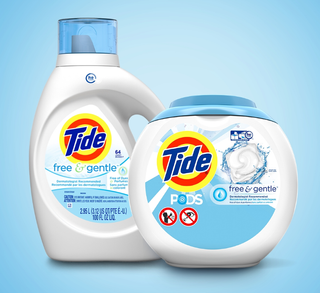This article originally appeared in the Cincinnati Business Courier, an American City Business Journals affiliate publication of Bizwomen.
A federal judge has dismissed a proposed class action against Procter & Gamble’s Tide products as another in a “seemingly endless supply of trivial (bordering on frivolous) lawsuits” over product labels.
U.S. District Court Judge for the Southern District of New York Cathy Seibel on Jan. 2 issued an opinion granting P&G’s dismissal motion in a suit brought Nov. 25, 2022, by Aja Adeghe, with Spencer Sheehan of New York-based Sheehan & Associates as her co-counsel.
Seibel in her opinion admonished Sheehan in a series of scolding footnotes questioning “how counsel can continue to bring such claims in good faith as he plainly knows he will be unable to justify them.”
Adeghe accused P&G of misleading consumers in a statement on the labels of its 2.72-liter Tide products that they contain enough detergent for “64 loads◊.”
The diamond refers to language on the back label informing consumers the product contains enough detergent for “approximately 64 loads as measured just below Bar 1 on cap.” The cap shows five bars, three of which are indicated as load sizes: Bar 1 is a “Medium Load;” Bar 3 is a “Large Load;” and Bar 5 is a “Full Load.”
Adeghe claimed the diamond is difficult to see, that finding the text on the back label is overly burdensome and that consumers in general expect the product to contain detergent for “64 full size loads of laundry.” She said consumers understand a “load” of laundry univocally – that “most Americans” do laundry when they “have enough laundry to fill up most of their washing machine” and that this is what constitutes a “load” for them, such that a “load” and a “full load” are either synonymous or redundant.
Adeghe said the 2.72-liter Tide product only contains enough detergent to do 32 “loads” as she defined them. She sued for monetary damages and costs and expenses, including attorneys fees.
But she doesn’t deserve them, Seibel ruled, because a reasonable person wouldn’t be misled by the label.
Adeghe’s claims rest on one word on the label having only one interpretation – hers – but “every reasonable shopper knows the devil is in the details” when a statement is ambiguous, Seibel wrote. That a “load” is alone a unit of measurement is an “implausible” assertion of fact. The term is almost always qualified in society: large loads, small loads, full loads, etc. A reasonable consumer wouldn’t read the term and reach a conclusion; they would see the diamond and consult the back label, according to Seibel.
“She ‘is not entitled to take a fleeting glimpse at the front of a product label, home in on the one word that confirms her hopes about the product… and then sue to recover the purchase price when she inevitably learns that the product is what the label, read in its entirety, says it is,'” Seibel wrote citing an April 2023 ruling from her own U.S. District Court.
Seibel called out Sheehan for co-signing a complaint on which he asserted vague violations of “Consumer Fraud Acts” of eight states without listing the acts, something he did twice previously in the U.S. District Court for the Northern District of New York: “The court therefore questions why he continues to plead in an insufficient fashion, when a modicum of legal research would avoid the problem.”
She also highlighted four previous cases where, as here, Sheehan tried to bypass a requirement in New York product warranty law that a consumer who believes an express warranty has been violated must send timely pre-suit notice to the seller of the alleged breach. Sheehan’s argument that notice isn’t necessary in retail sales relies on a misread of ample precedent, Seibel said, and he “should be aware by now that this sweeping notice argument… is frivolous.”
Seibel concluded noting courts “around the country have been inundated” with trivial and borderline frivolous lawsuits “thanks to Mr. Sheehan” asking the courts to read the labels of consumer goods “in manners that strain credulity” or ask them to pretend ignorance.
“The case before the court here is one of many that should give pause to Mr. Sheehan and serve as a reminder that CONTEXT MATTERS and that a label should be read in its entirety,” she wrote (caps and bolding in original).
Sheehan did not immediately respond to a comment request.
